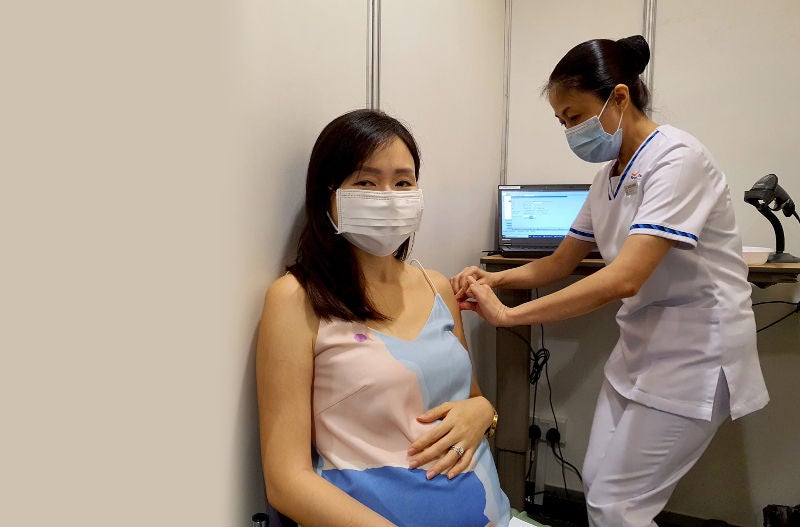
Risks of COVID-19 in pregnancy
Pregnant women are at a higher risk of COVID-19 infection due to the physiological changes caused by pregnancy (such as immunity, cardiac output, oxygen consumption and lung capacity) which can cause them to be less resilient against respiratory infections.
Evidence shows that pregnant women are at higher risk of facing severe complications if they are infected with COVID-19, compared to the non-pregnant population. Some of these risks involve the development of serious complications which increase the pregnant woman’s risk of needing intensive care and invasive ventilation, as well as developing potentially lethal complications such as deep vein thrombosis and pulmonary embolism. Pregnant women also have a doubled risk of preterm birth if they are symptomatic, and these babies may require neonatal intensive care.
KKH advises COVID-19 vaccination can be given at any time in pregnancy
KKH advises pregnant women to seek COVID-19 vaccination early, as they are at higher risk of facing severe complications if they are infected with COVID-19, compared to the non-pregnant population. While evidence proves that the mRNA vaccines are safe and effective in all stages of pregnancy, pregnant women may wish to seek their doctor’s advice before taking the vaccination if they feel unwell due to symptoms commonly experienced in the first trimester.
The risk of pregnant women suffering from severe complications when infected with COVID-19 weighs much higher in comparison to the potential side effects of the vaccination (e.g., fever, pain at injection site, etc). In this pandemic, the known and potential benefits of COVID-19 vaccination outweigh the known and potential risks of infection.
Safety of COVID-19 vaccination in pregnancy
Singapore has joined the United Kingdom (UK) and United States (US) to advise pregnant women to receive COVID-19 vaccination. In the US, more than 168,000 pregnant women have been vaccinated as at mid October 2021, and no safety concerns have been identified. Evidence on COVID-19 vaccines is being continuously reviewed by the World Health Organization and the regulatory bodies in the UK, US, Canada and Europe.
Evidence shows that COVID-vaccination is safe for pregnant and breastfeeding women
International studies currently show that the COVID-19 vaccination is safe for pregnant and breastfeeding women. Individuals who have a history of severe allergic reactions to COVID mRNA or its components are encouraged to discuss the benefits and side effects of the vaccine with their doctor prior to undertaking the vaccination.
While there are as yet no double-blind COVID-19 vaccination clinical trials in pregnant women, real-world data has been collected worldwide on the safety of the mRNA COVID-19 vaccination for this group. The mRNA vaccines have been shown to generate antibody production in both pregnant and breastfeeding women. These antibodies are transferred passively across the placenta to the baby antenatally or before birth, and antibodies have also been detected in breastmilk after vaccination. While the exact nature and extent of protection for the babies remains to be ascertained, these findings are promising.
Study finds no increased risks of adverse outcomes in pregnant women vaccinated against COVID-19
In the United States (US), the safety of mRNA COVID-19 vaccinations was analysed in about 4,000 vaccinated pregnant women. These results were peer-reviewed and published in April 2021 in the New England Journal of Medicine1.
Out of 3,958 women, 827 had completed their vaccination at the point of reporting, and 86 per cent of them had a live birth. Data derived from the US study participants indicated no increased risks of adverse outcomes in the pregnant women who were vaccinated against COVID-19 and their babies. Additionally, there was no observed increase in miscarriage, fetal abnormalities, small babies or preterm birth rates in pregnant women who were vaccinated.
Key recommendations for COVID-19 vaccination in pregnancy
|
Read more: |
 | Professor Tan Hak Koon, Chairman, Division of Obstetrics and Gynaecology, KKH Prof Tan Hak Koon is Chairman and Senior Consultant with the Division of Obstetrics and Gynaecology at KKH. At SingHealth, he holds the appointment of Chairman of the SingHealth-Duke NUS Obstetrics and Gynaecology Academic Clinical Programme (OBGYN-ACP) and Designated Institutional Official (DIO) at SingHealth Residency concurrently. Additionally, he is an Associate Dean, Office of Academic and Clinical Development, Duke-NUS Medical School. |
References:
|














 Get it on Google Play
Get it on Google Play